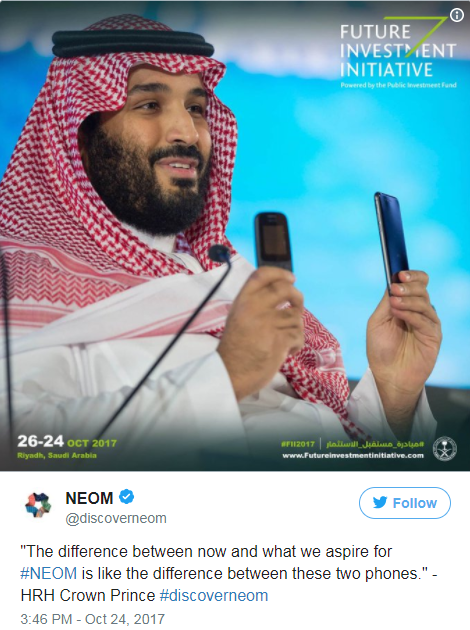All men dream: but not equally.
Those who dream by night, in the dusty recesses of their minds, wake in the day to find that it was vanity.
But the dreamers of the day are dangerous men, for they may act their dreams with open eyes, to make it possible.
This, I did.T.E. Lawrence
Robot citizens. Flying cars. Saltwater farming. Nanotechnology. All built into a fully automated megacity spanning three countries, powered entirely by renewable energy. You won’t guess who dreamed this vision up. No, not some Silicon Valley elite, or a science fiction novelist… it’s the crown prince of Saudi Arabia, who proclaims that “only dreamers are welcome” to join him in his new venture.
And he appears to be serious about the project – the Saudis and their friends are committed to investing at least half a trillion dollars into this wonderland, which they aim to build from scratch, in the middle of the desert.
Dreamers of the day seem to have multiplied in the Middle East since Lawrence of Arabia’s time. The oil boom and the petro-politics that followed created a vacuum which has been swiftly filled by politicos, fundamentalists, arms dealers and mercenaries.
I recently detailed in an issue of London Investment Alert the huge influence Saudi Arabia has over the rest of the world through its control over the price of oil. This influence is magnified by the Arabs’ military and political relationship with the US.
However, the Arabs are totally beholden to global demand for oil. When the oil price slides, the Saudis need to borrow money to keep spending money on the projects that matter to them. Like buying weapons from the West (£1.1 billion purchased from the UK alone this year) and trying them out in Yemen. Or cultivating the crown prince’s fondness for £450 million superyachts.
Saudi Arabia is now running the largest budget deficit as a proportion of GDP in the G20. Low oil prices have become a chain dragging the economy down. Its ambition to build a giant technopolis in the desert is the figurehead of its efforts to escape the black gold that has furnished it so well for decades.
It is also an effort to recoup the billions of dollars that Saudis spend on education, healthcare and tourism abroad by providing it in a local and idyllic (stressed five times in the factsheet) setting.
The metropolis is to be called Neom (meaning “new future” through a combination of Latin and Arabic), and is described as an “independent special area”. It will have its own laws, taxes and regulations, separate to the countries that contain it (Saudi Arabia, Jordan and Egypt), and all government services are to be completely automated.
A mirage of the desert
 Source: Twitter
Source: Twitter
Which of these phones has a longer battery life? My money’s on the one on the left. Perhaps the one on the right has some flashier functions, but it’ll burn out far faster. Burning out is a definite risk for this project, which promotes itself as “the startup the size of a country”.
Considering the majority of startups fail, I’m not sure I would want to live in one that is 10,000 square miles across. Not to mention what they plan on doing while I’m there – this is from the Neom website (emphasis mine):
… a chance to test out inventions like personalized, fully automated, point-to-point transfer, passenger drones, self-learning traffic systems in a live destination setting and refine them to perfection.
Testing passenger drones in a live setting?
Watch out below
Other tech promises offered by Neom read like a techie’s Christmas list:
NEOM won’t just innovate in nanotechnology, 3D printing, sensors, IoT devices, electrical vehicles, robotics and renewables. Starting from scratch means a chance to innovate the very systems underpinning those innovations of R&D, supply, transport, infrastructure.
Apparently at Neom it will also discover “whole new kinds of energy the world has yet to hear of”.
Did it miss anything? Maybe a Neom cryptocurrency? Come to think of it, Neom does sound like one. But the Saudi royal family doesn’t seem to be fond of them, as one Saudi prince declared recently to CNBC regarding bitcoin:
“It doesn’t make sense. This thing is not regulated. It’s not under control. It’s not under the supervision [of the] United States Federal Reserve or any other central bank. I don’t believe in this whole thing at all. I think it’s going to implode.”
Ironically enough, a lot of the promotional material for Neom reads like the marketing for a scam cryptocurrency. The recent frenzy of hype and news coverage for crypto has caused large quantities of “dumb money” to enter the market. Now, anyone who can paste vague promises of “innovation” and “disruptive growth” on to a flashy website can make a fortune selling worthless clones of successful cryptocurrencies – something Sam Volkering works to keep subscribers to Revolutionary Tech Investor clear of.
Neom isn’t a scam
But I reckon it will underperform for its investors in a similar way.
The project that declares itself “unmatched in intelligence”, promises too much. It’s not just tech it promises to revolutionise and innovate upon – everything from food to media is included too.
During his travels in the Middle East, Lawrence of Arabia became convinced that there was a lost ancient city hidden in the middle of the vast Rub’ al Khali desert. Bedouin legends named it Ubar, describing a lost paradise of golden pillars and great wealth. Lawrence called it the “Atlantis of the Sands”.
He never found it. Nor has anyone definitively found it since.
Those dreaming of building a new one will be similarly disappointed.
Until next time,
Boaz Shoshan
Editor, Southbank Investment Research
Category: Geopolitics

